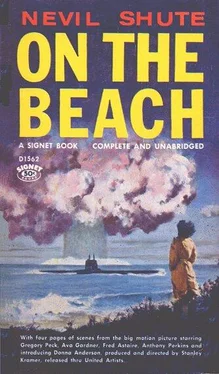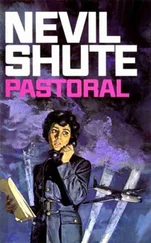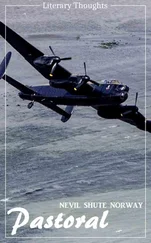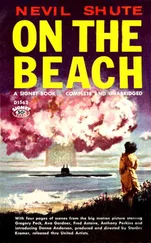Dwight nodded. "The bombers were Russian, and I’ve heard it said that they had Russian markings. It’s quite possible."
"Good God!" said the Australian. "So we bombed Russia?"
"That’s what happened," said the captain heavily.
John Osborne said, "It’s understandable. London and Washington were out—right out. Decisions had to be made by the military commanders at dispersal in the field, and they had to be made quick before another lot of bombs arrived. Things were very strained with Russia, after the Albanian bomb, and these aircraft were identified as Russian." He paused. "Somebody had to make a decision, of course, and make it in a matter of minutes. Up at Canberra they think now that he made it wrong."
"But if it was a mistake, why didn’t they get together and stop it? Why did they go on?"
The captain said, "It’s mighty difficult to stop a war when all the statesmen have been killed."
The scientist said, "The trouble is, the damn things got too cheap. The original uranium bomb only cost about fifty thousand quid towards the end. Every little pipsqueak country like Albania could have a stockpile of them, and every little country that had that, thought it could defeat the major countries in a surprise attack. That was the real trouble."
"Another was the aeroplanes," the captain said. "The Russians had been giving the Egyptians aeroplanes for years. So had Britain for that matter, and to Israel, and to Jordan. The big mistake was ever to have given them a long-range aeroplane."
Peter said quietly, "Well, after that the war was on between Russia and the Western powers. When did China come in?"
The captain said, "I don’t think anybody knows exactly. But I’d say that probably China came in right there with her rockets and her radiological warfare against Russia, taking advantage of the opportunity. Probably they didn’t know how ready Russia was with radiological warfare against China." He paused. "But that’s all surmise," he said. "Most of the communications went out pretty soon, and what were left didn’t have much time to talk to us down here, or to South Africa. All we know is that the command came down to quite junior officers, in most countries."
John Osborne smiled wryly. "Major Chan Sze Lin."
Peter asked, "Who was Chan Sze Lin, anyway?"
The scientist said, "I don’t think anybody really knows, except that he was an officer in the Chinese Air Force, and towards the end he seems to have been in command. The Prime Minister was in touch with him, trying to intervene to stop it all. He seems to have had a lot of rockets in various parts of China, and a lot of bombs to drop. His opposite number in Russia may have been someone equally insignificant. But I don’t think the Prime Minister ever succeeded in making contact with the Russians. I never heard a name, anyway."
There was a pause. "It must have been a difficult situation," Dwight said at last. "I mean, what could the guy do? He had a war on his hands and plenty of weapons left to fight it with. I’d say it was the same in all the countries, after the statesmen got killed. It makes a war very difficult to stop."
"It certainly made this one. It just didn’t stop, till all the bombs were gone and all the aircraft were unserviceable. And by that time, of course, they’d gone too far."
"Christ," said the American softly, "I don’t know what I’d have done in their shoes. I’m glad I wasn’t."
The scientist said, "I should think you’d have tried to negotiate."
"With an enemy knocking hell out of the United States and killing all our people? When I still had weapons in my hands? Just stop fighting and give in? I’d like to think that I was so high-minded but—well, I don’t know." He raised his head. "I was never trained for diplomacy," he said. "If that situation had devolved on me, I wouldn’t have known how to handle it."
"They didn’t, either," said the scientist. He stretched himself, and yawned. "Just too bad. But don’t go blaming the Russians. It wasn’t the big countries that set off this thing. It was the little ones, the Irresponsibles."
Peter Holmes grinned, and said, "It’s a bit hard on all the rest of us."
"You’ve got six months more," remarked John Osborne. "Plus or minus something. Be satisfied with that. You’ve always known that you were going to die sometimes. Well, now you know when. That’s all." He laughed. "Just make the most of what you’ve got left."
"I know that," said Peter. "The trouble is I can’t think of anything that I want to do more than what I’m doing now."
"Cooped up in bloody Scorpion ?"
"Well—yes. It’s our job. I really meant, at home."
"No imagination. You want to turn Mohammedan and start a harem."
The submarine commander laughed. "Maybe he’s got something there."
The liaison officer shook his head. "It’s a nice idea, but it wouldn’t be practical. Mary wouldn’t like it." He stopped smiling. "The trouble is, I can’t really believe it’s going to happen. Can you?"
"Not after what you’ve seen?"
Peter shook his head. "No. If we’d seen any damage ..."
"No imagination whatsoever," remarked the scientist. "It’s the same with all you service people. That can’t happen to me ." He paused. "But it can. And it certainly will."
"I suppose I haven’t got any imagination," said Peter thoughtfully. "It’s—it’s the end of the world. I’ve never had to imagine anything like that before."
John Osborne laughed. "It’s not the end of the world at all," he said. "It’s only the end of us. The world will go on just the same, only we shan’t be in it. I dare say it will get along all right without us."
Dwight Towers raised his head. "I suppose that’s right. There didn’t seem to be much wrong with Cairns, or Port Moresby either." He paused, thinking of the flowering trees that he had seen on shore through the periscope, cascaras and flame trees, the palms standing in the sunlight. "Maybe we’ve been too silly to deserve a world like this," he said.
The scientist said, "That’s absolutely and precisely right."
There didn’t seem to be much more to say upon that subject, so they went up on to the bridge for a smoke, in the sunlight and fresh air.
They passed the Heads at the entrance to Sydney Harbour soon after dawn next day and went on southwards into the Bass Strait. Next morning they were in Port Phillip Bay, and they berthed alongside the aircraft carrier at Williamstown at about noon. The First Naval Member was there to meet them and he was piped aboard Scorpion as soon as the gangway was run out.
Dwight Towers met him on the narrow deck. The admiral returned his salute. "Well, Captain, what sort of a cruise did you have?"
"We had no troubles, sir. The operation went through in accordance with the orders. But I’m afraid you may find the results are disappointing."
"You didn’t get very much information?"
"We got plenty of radiation data, sir. North of twenty latitude we couldn’t go on deck."
The admiral nodded. "Have you had any sickness?"
"One case that the surgeon says is measles. Nothing of a radioactive nature."
They went below into the tiny captain’s cabin. Dwight displayed the draft of his report, written in pencil upon sheets of foolscap with an appendix of the radiation levels at each watch of the cruise, long columns of small figures in John Osborne’s neat handwriting. "I’ll get this typed in Sydney right away," he said. "But what it comes to is just this—we found out very little."
"No signs of life in any of those places?"
"Nothing at all. Of course, you can’t see very much, at periscope height from the waterfront. I never realized before we went how little we’d be able to see. I should have, perhaps. You’re quite a ways from Cairns out in the main channel, and the same at Moresby. We never saw the town of Darwin at all, up on the cliff. Just the waterfront." He paused. "There didn’t seem to be much wrong with that."
Читать дальше












